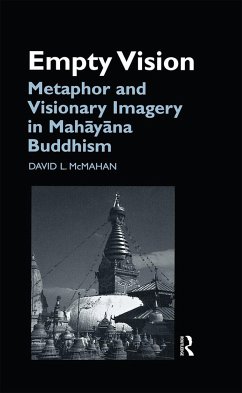This volume examines the complex functions of visual metaphor in Indian Mahayana Buddhism. McMahan argues that the symbolic role of sight in Mahayana Literature shapes the traditions epistemic paradigm and concepts of enlightenment, as well as its visionary literature, symbolic imagery and visualization practices. Visual metaphors in a number of Mahayana sutras construct a discourse in which visual perception serves as a model for knowledge and enlightenment. In the Perfection of Wisdom(prajnaparamita) and other Mahayana literature, immediate access to reality is symbolized by vision and set in opposition to language and conceptual thinking, which are construed as obscuring reality. In addition to its philosophical manifestations, the tension between vision and language also functioned as a strategy of legitimation in the struggle of the early heterodox Mahayana movement for authority and legitimacy. This emphasis on vision also serves as a resource for the abundant mythical imagery in Mahayana sutras, imagery that is ritualized in Vajrayana visualization practices. McMahan brings a wide range of literature to bear on this issue, including a rare analysis of the lavish imagery of the Gandavyuha Sutra in its Indian context. He concludes with a discussion of Indian approaches to visuality in the light of some recent discussions of 'ocularcentrism' in the west, inviting scholars to expand the current discussion of vision and its roles in constructing epistemic systems and cultural practice beyond its exclusively European and American focus. The book will be of interest to historians of religion and students and scholars of Buddhism and South Asia, as well as those interested incross-cultural philosophy and cultural studies.








